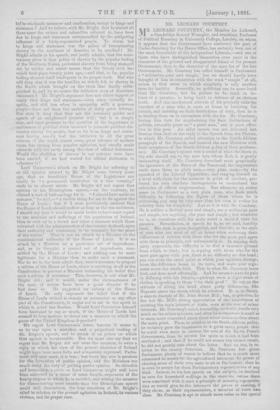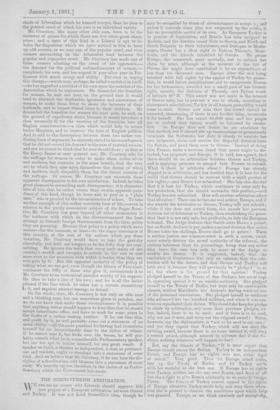MR. LEONARD COURTNEY.
R. LEONARD COURTNEY, the Member for Liskeard, .1Y.I a Cambridge Second Wrangler, and sometime Professor of Political Economy in University College, London, on whom it appears that the Government have conferred the post of Under-Secretary for the Home Office, has certainly been one of the most formidable of the independent Liberals,—and one of those who have distinguished themselves even more in the character of the grieved and disappointed friend of the present Government, then in the character of the open foe of the late Government. Mr. Courtney has called himself in Parliament " utilitarian pure and simple," but wo should hardly have thought of him in connection with the \word " simple " at all, unless in that sense in which simplicity is only another term for lucidity. Assuredly, no politician can be more lucid than Mr. Courtney, but he prefers to be lucid in de- fence of a paradox, to being lucid in defence of an obvious truth. And this intellectual attitude of his precisely suits the function of a man who is more at home in lecturing his friends, and insisting on their derelictions of duty, than he is in leading them on to encounters with the foe. Mr. Courtney, having this torn for emphasizing the finer distinctions of polities, naturally poses as " a plain man," and is most effec- tive in this pose. An abler speech was not delivered last Session than that on the reply to the Speech from the Throne, in which Mr. Courtney called attention to the South-African paragraph of the Speech, and taunted the new Ministers with their acceptance of the South-African pulley of their predeces- sore, Mr. Courtney's speech was a model of what the thorn in the side should say to the man into whose flesh it is gently insinuating itself. Mr. Courtney described most graphically the ignorance of the Boers of the Transvaal, tho impressions made upon them as plain men,—very plain men,—by the speeches of the Liberal Opposition; and ra.ng;ng himself on a level with them for the moment in point of intellect, pro- fessed his own absolute incompetence to 1111110176tattd the subtleties of official tergiversation. But whenever an orator poses in Parliament as a very plain man, who finds much difficulty in following the flights of those whom he is criticising, you may be very sure that his turn is rather for subtlety than for simplicity. And so it is with Mr. Courtney. He is neither a Radical pure and simple, nor a utilitarian pure amid simple, nor anything else pure and simple ; but whatever he is, he combines with his main creed a decided taste for paradox. Nevertheless, in speech he is, as we said, lucidity His style is pure, thoughtful, and forcible, as the style of Men who are most of all at home when enforcing their differences of opinion with those who for the most Net agree with them in principle, not unfrequently is. ln arguing with party opponents, the difficulty is to find a common ground from which to start; but in arguing with those who for the most part agree with you, there is no difficulty on his head ; you can seize the exact point at which your opinions diverge, trace the difference home to its roots, and make your argu- ment cover the whole field. This is what Mr. Courtney loves best, and does most effectually. And he seems to have no pain in differing with his frierele,—perhaps even a sl gill, sense of elation in speaking to them "for their good." He enjoys the attitude of lifting his head above party differences, like Neptune above the storm which he rebuked. II, is, in theory, a sincere disciple, of Mr. John Stuart Mill ; hut, in practice,. he has not Mr. Mill's strong appreciation of the i mi pertance of securing the main interest at stake, even at the ce.sit of minor interests. Mr. Courtney's whirl, insensibly, no doubt, dwells very much on the minor interests, and often he so ex t.), esses himself as to seem more concerned about these minor interest than about the main point. Thus, in relation to our South-African policy, ho certainly gave the impression to a great many people that he cared even more to reverse the acts of Sir Bartle Frere's Government, than to reverse the spirit in which it had been conducted ; and that if ho could not secure the hewer result, ho did not greatly .eare about the latter. At ho, too, in re- 'ellen to the county franchise. Mr, 0ourthey has given Parliament plenty of reason to believe that he is much more concerned to secure for the agricultural labourers he power of electing some of their own caste to sit in PaiFement, than he ie even to secure for them Parliamentary represen tii ion of any kind. Indeed, in his last speech on the eutijeet, lie declined to veto for household suffrage in the collie lee, unless there were combined with it BUCh a principle of minority representa- tion as would give to the labourers the poeer 01 miming, if they clime, as their representative, a metnher of their own class. Mr. Courtney is apt to attach more value to the special
shade of Liberalism which he himself accepts, than he does to the general creed of which his own is an individual variety.
Mr. Courtney, like many other able men, loves to be the mainstay of causes for ,which there are few other great cham- pions ; and a taste of this kind in a Liberal is apt to in- volve the disposition which we have noticed in him to hunt up odd corners, as we may say, of the popular creed, and even corners encroaching on the debateable land between the popular and unpopular creed. Mr. Courtney has made one of these corners abutting on the creed of his opponents,— the demand for the political enfranchisement of women,— completely his own, and has argued it year after year in Par- liament with much energy and ability. But even in urging this change,—which may, perhaps, be called a crotchet in itself, —he has engrafted a crotchet of his own upon the crotchet of the Association which he represents. He demanded the franchise for women, ho said one year, on the ground that it would tend to diminish the deplorable ignorance and narrowness of women, to make them fitter to share the interests of their
husbands, and to impart liberal ideas to their children. He demanded the franchise for women the next year, he said, on the ground of expediency alone, because .it would introduce a class unusually fit for the exercise of the franchise into all English constituencies,—a class which would help to secure better Members, and to improve the tone of English politics. And to add to the discrepancy between these two rather con- flicting lines of argument, he expressly stated in his second speech that he am not extend his demand to the case of married women, and saw no reason to think that he ever should do so ; so that as Sir Henry James at once pointed out, Mr. Courtney asks for the suffrage for women in order to make them better wives and mothers, but consents, in the same breath, that the very act by which they take upon themselves the duties of wives and mothers shall disqualify them for the future exercise of the suffrage. Of course, Mr. Courtney can reconcile these apparent discrepancies to his own satisfaction. Indeed, be takes great pleasure in reconciling such discrepancies ; it is character- istic of him that he rather courts than avoids apparent para-
doxes of this kind, though he loves also to pose as a "plain man " who is puzzled by the inconsistencies of others. To take another example of this rather crotchety turn of his ;—even in relation to the purely economical subject of the Sugar Boun- ties, Mr. Courtney has gone beyond all other economists in the boldness with which he has discountenanced the least attempt to dissuade foreign Governments from the false policy they are pursuing. Because that policy is a policy which saves money—for the moment, at least—to the sugar consumers of this country, at the cost of the nations which pay these bounties Mr. Courtney would have us take the gratuity cheerfully, and hold our tongues as to the folly they are com- mitting. Ile ignores the truth that every such waste of one country's wealth and energies, is certain in the end to cost more even to the countries with which it trades, than they can ever gain by it. But the apparent audacity of the policy of taking what we can get, even though the theory of Free-trade condemns the fly of those who give it, recommends it to Mr. Courtney as an economical paradox worthy of his support. Ile likes to take a line of his own ; and he is all the better pleased if the line which he Lakes has a certain eccentricity •
VI it, and requires unusual courage to defend.
On the whole, then, Mr. Courtney is not only an able man and a thinking man, but one somewhat given to paradox, and we do not know that under these circumstances it is possible that anything better should happen to him than that he should accept subordinate office, and have to work for some years in the shafts of a rather tasking routine. If he can bear this, and profit by it, he will probably come out a statesman of no Mean ability,—all the more practical for having had to conform himself for no inconsiderable time to the orders of others. If he cannot boar it, but kicks over the traces, he will pro- . bably remain what he is, a considerable Parliamentary speaker, but one too apt to isolate himself, for any great result, A speaker so lucid, a thinker so independent, a man so pertinaci- ous and resolute, ought to develop° into a statesman of some rank. And we believe that Mr. Courtney, if he can bear the dis- cipline of subordination, will blossom into a statesman of some rank: We heartily rejeit e, therefore, in the choice of an Under- Secretary which the Govertnnent has made.















































 Previous page
Previous page